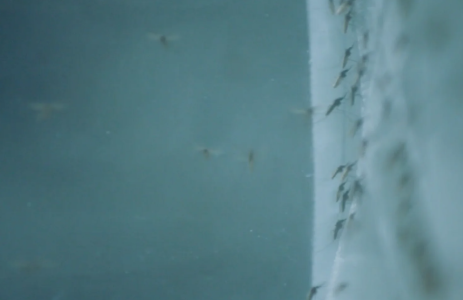Genetically modified insects target health concerns, pending approval
By
Gian T
- Replies 8
As time brings wisdom and new challenges, a global health threat grows significantly.
A disease that has affected many regions worldwide is starting to make its presence felt locally, with the spread of its carrier raising concern.
This health issue can cause severe symptoms that impact daily life for extended periods.
In a twist that sounds like it's straight out of a science fiction novel, the proposed solution involves breeding more mosquitoes—but not just any mosquitoes.
These are genetically modified insects designed by the UK-based company Oxitec.
Oxitec has partnered with Australia's national science agency, the CSIRO, to potentially bring this technology Down Under.
Oxitec operates the world's largest mosquito breeding factory in Brazil, where it produces what it calls 'friendly' mosquitoes.
Entering the Brazilian mosquito facility feels like stepping into a scene from a horror film.
According to Oxitec’s chief strategy officer, Neil Morrison, visitors first notice the intense buzzing noise created by the thousands of mosquitoes within.
'They’re interested as you walk past the cage because they can smell you,' he said.
'So you walk past your mosquito cage, they get excited and start flying around.'
These genetically engineered insects are programmed so that only non-biting males survive.
The idea is that when these males are released and mate with wild females, their offspring will predominantly be male, leading to a rapid decrease in the mosquito population—by over 95 per cent in just a few breeding cycles.
This isn't just a distant plan; pending regulatory approval, Australian governments could release Oxitec's strain of 'friendly' mosquitoes within the next one to two years.
The implications are vast, and the ethical considerations are just as significant as the scientific ones.
The buzzing of thousands of mosquitoes in a factory might sound like a horror movie scene, but it's a reality that could be coming to our backyard.
The Aedes aegypti mosquito, the primary vector for dengue fever, has a history of spreading worldwide from its origins in Africa.
This is a testament to the adaptability and resilience of this insect, which has thrived in urban environments and now poses a significant health threat exacerbated by climate change.
While the mortality rate from dengue fever can be kept low with medical care, untreated severe cases are deadly, particularly in remote and developing regions.
Currently, the mosquito is found in northern and central Queensland, but efforts are ongoing to prevent its spread to other parts of Australia.
The Oxitec and CSIRO partnership also targets the Asian tiger mosquito (Aedes albopictus), another disease carrier that has yet to establish itself on the mainland but could potentially spread dengue, Zika, and chikungunya.
'Over the last 200 years, it’s spread right across the world, including Australia. In 99 per cent of its range, it's an invasive species, but it's so well adapted to our towns and cities,' Morrison said.
'It's been a massive success story for the mosquito, but it poses such a massive threat to people's health worldwide now and with climate change, that danger is just set to continue to increase.'
The cost of this program remains undisclosed, but Oxitec assures that their approach is preferable to traditional methods like insecticides, which can harm non-target species and lead to resistance in target species.
In Brazil, city governments purchase these genetically modified mosquitoes as part of their dengue fever control programs.
Oxitec hopes to make them available for government purchase in Australia as well.
Interestingly, this isn't the only innovative method being developed in Australia to combat mosquitoes.
Researchers at the ARC Centre of Excellence in Synthetic Biology at Macquarie University are studying mosquitoes that carry toxins.
These toxins are transferred during mating and reduce the lifespan of females.
Staying informed and engaged is essential as we navigate the complexities of modern health threats and innovative proposed solutions.
The introduction of genetically modified organisms into our environment is a topic that warrants careful consideration and public discourse.
 What are your thoughts on this cutting-edge science? Are the potential health benefits worth the risks of releasing genetically modified insects into the wild? Share your opinions with us, and let's discuss the future of disease control and environmental management in Australia.
What are your thoughts on this cutting-edge science? Are the potential health benefits worth the risks of releasing genetically modified insects into the wild? Share your opinions with us, and let's discuss the future of disease control and environmental management in Australia.
A disease that has affected many regions worldwide is starting to make its presence felt locally, with the spread of its carrier raising concern.
This health issue can cause severe symptoms that impact daily life for extended periods.
In a twist that sounds like it's straight out of a science fiction novel, the proposed solution involves breeding more mosquitoes—but not just any mosquitoes.
These are genetically modified insects designed by the UK-based company Oxitec.
Oxitec has partnered with Australia's national science agency, the CSIRO, to potentially bring this technology Down Under.
Oxitec operates the world's largest mosquito breeding factory in Brazil, where it produces what it calls 'friendly' mosquitoes.
Entering the Brazilian mosquito facility feels like stepping into a scene from a horror film.
According to Oxitec’s chief strategy officer, Neil Morrison, visitors first notice the intense buzzing noise created by the thousands of mosquitoes within.
'They’re interested as you walk past the cage because they can smell you,' he said.
'So you walk past your mosquito cage, they get excited and start flying around.'
These genetically engineered insects are programmed so that only non-biting males survive.
The idea is that when these males are released and mate with wild females, their offspring will predominantly be male, leading to a rapid decrease in the mosquito population—by over 95 per cent in just a few breeding cycles.
This isn't just a distant plan; pending regulatory approval, Australian governments could release Oxitec's strain of 'friendly' mosquitoes within the next one to two years.
The implications are vast, and the ethical considerations are just as significant as the scientific ones.
The buzzing of thousands of mosquitoes in a factory might sound like a horror movie scene, but it's a reality that could be coming to our backyard.
The Aedes aegypti mosquito, the primary vector for dengue fever, has a history of spreading worldwide from its origins in Africa.
This is a testament to the adaptability and resilience of this insect, which has thrived in urban environments and now poses a significant health threat exacerbated by climate change.
While the mortality rate from dengue fever can be kept low with medical care, untreated severe cases are deadly, particularly in remote and developing regions.
Currently, the mosquito is found in northern and central Queensland, but efforts are ongoing to prevent its spread to other parts of Australia.
The Oxitec and CSIRO partnership also targets the Asian tiger mosquito (Aedes albopictus), another disease carrier that has yet to establish itself on the mainland but could potentially spread dengue, Zika, and chikungunya.
'Over the last 200 years, it’s spread right across the world, including Australia. In 99 per cent of its range, it's an invasive species, but it's so well adapted to our towns and cities,' Morrison said.
'It's been a massive success story for the mosquito, but it poses such a massive threat to people's health worldwide now and with climate change, that danger is just set to continue to increase.'
The cost of this program remains undisclosed, but Oxitec assures that their approach is preferable to traditional methods like insecticides, which can harm non-target species and lead to resistance in target species.
In Brazil, city governments purchase these genetically modified mosquitoes as part of their dengue fever control programs.
Oxitec hopes to make them available for government purchase in Australia as well.
Interestingly, this isn't the only innovative method being developed in Australia to combat mosquitoes.
Researchers at the ARC Centre of Excellence in Synthetic Biology at Macquarie University are studying mosquitoes that carry toxins.
These toxins are transferred during mating and reduce the lifespan of females.
Staying informed and engaged is essential as we navigate the complexities of modern health threats and innovative proposed solutions.
The introduction of genetically modified organisms into our environment is a topic that warrants careful consideration and public discourse.
Key Takeaways
- Genetically modified mosquitoes are being considered as a solution to combat the spread of dengue fever in Australia, with plans for release pending regulatory approval.
- The genetically engineered mosquitoes, created by UK-based Oxitec, are designed so that only non-biting males survive, reducing mosquito populations.
- The Aedes aegypti mosquito, carrier of dengue fever and other viruses like Zika and yellow fever, has spread globally and is found in some areas of Australia.
- Alternative methods to control mosquitoes, such as insecticides, pose risks to non-target species and can lead to immunity in mosquitoes, whereas the Oxitec approach targets only the mosquito population without these side effects.








